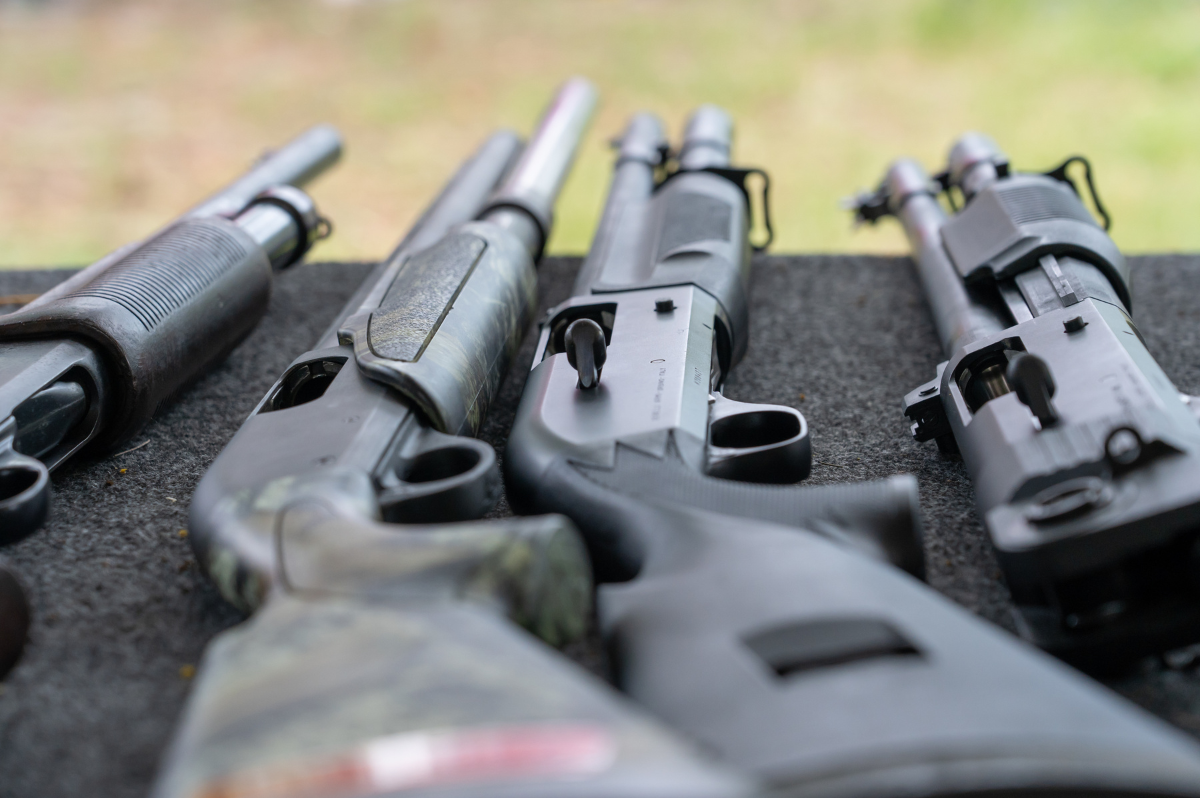No product found in cart!

Choosing Between a Pump or Gas Operated Shotgun
As far as shotguns go, two of the most popular kinds are pump action and gas operated. Both have long standing use and tradition for competition shooting, hunting, and self-defense. The following guide will help gun buyers looking to purchase a new shotgun.
Let’s compare these two types of shotguns, both of which are equally useful, to see which one is right for you.
Benefits of Pump Shotguns
A pump action shotgun has a tubular magazine that commonly holds between 5 to 8 shotgun shells depending on the model. Once the shotgun shell in the chamber is fired, the shooter manually pumps the action with the foregrip to eject the spent shell and chamber a new one.
Pump shotguns are best known for their reliability. Due in most part to the simple mechanics and few moving parts, pump shotguns rarely malfunction. In terms of shootability and accuracy, pump shotguns are not much different than gas operated shotguns.
Another benefit of pump shotguns is they’re generally inexpensive, especially if you buy used. Pump actions are commonly produced by a number of different firearms manufacturers, so they’re easy to find, and you can typically get your hands on one for as little as $250-$300.
Benefits of Gas Operated Shotguns
A gas operated shotgun, also known as a semi-automatic or autoloader is another common type of shotgun. A gas operated shotgun uses the spent gasses from the fired shell to automatically operate the action and chamber the next shell. This mechanism works in much the same way as semi-automatic rifles and handguns.
The primary benefit of gas operated shotguns is the ability for extremely fast follow up shots. With pump action shotguns, there is a delay in the amount of time it takes the shooter to operate the pump action and fire the next shot. With gas operated shotguns, the shooter can more or less fire as quickly as they can pull the trigger.
A capacity for quick follow up shots makes gas operated shotguns a popular choice for bird hunting when fast instinctual shooting is necessary with multiple targets at once. The same can be said for competition clay target shooting and self-defense situations.
In addition, some gas operated shotguns result in less recoil and smoother shooting because the force of the gas is diverted from the shooter to cycle the action. This results in less felt recoil and an overall more enjoyable shooting experience.
Drawbacks of Pump Shotguns
Pump action shotguns have many positive attributes, but they’re not without their flaws, as with any firearm.
The biggest drawback for pump shotguns is the time it takes to operate the pump action. It may only take a split second, but that split second can make the difference between hitting your target and missing it entirely. There isn’t anything that can be done about this delay, as it’s just the nature of the action. For more reliability, the trade off is slower follow up shots.
Another downside of pump shotguns is because the spent gasses aren’t used to cycle the action, they have more felt recoil. This is not a huge deal for most people, but if you spend an extended amount of time in the field or in the clay range, your shoulder is sure to be quite sore.
Drawbacks of Gas Operated Shotguns
Many expert shooters swear by gas operated shotguns and refuse to use anything else. With quicker follow up shots and smoother recoil, it’s hard to argue, but they’re not for everyone.
A big drawback for gas operated shotguns is first and foremost cost. It’s almost a guarantee a gas operated shotgun will cost you more than a pump action. You may be able to find a cheap autoloader for around $600, but any decent gas operated shotgun will cost you at least $1,000. If you don’t have that kind of money to spend, you may be better off with a pump shotgun.
For anyone who’s shot semi-automatic guns of any kind, you know all too well malfunctions can be expected. If a shell doesn’t eject properly, the gas system isn’t tuned properly, or any number of other factors, you’ll experience jams that will make your gun temporarily inoperable.
Malfunctions just aren’t something you have e to worry about as much with pump shotguns. If ultimate reliability is important to you, a gas operated shotgun may not be what you’re looking for.
Best Shotgun for Beginners
If you’re looking to buy your first shotgun, a pump action is probably your best bet. Due to the low cost, easy to use action, and dependability, a pump action is a great place to start. Once you get used to using a shotgun, then you can choose to graduate to an autoloader.
Best Shotgun for Self Defense
Self defense situations are often chaotic and there is little to no time to think. If you’re looking for a shotgun purely for self-defense, a gas operated shotgun is the best overall option. All you have to remember is to pull the trigger and the gun will do the rest. Not having to operate a pump action is one less thing to worry about, which may save your life.
Conclusion
Pump action and gas operated shotguns are great tools for hunting, target shooting, and self-defense. Ultimately one isn’t better than the other as a whole. Each type has their benefits and drawbacks.
Whether a pump action or gas operated shotgun is right for you will just depend on a few things such as your budget, importance on dependability, desire for quick follow up shots, and intended use.